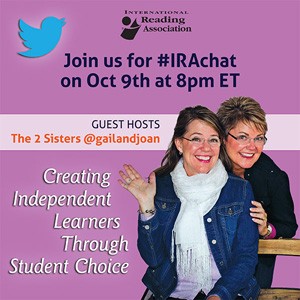 Gail Boushey and Joan Moser are known all over the world as “The 2 Sisters.” Real-life sisters and educators, the woman have more than 60 years of experience combined in K-6 and special education, as well as a reading resource specialist and a literacy coach. As a professional development training duo, they collaborated to find a replicable, reliable way to teach children how to be independent lifelong learners.
Gail Boushey and Joan Moser are known all over the world as “The 2 Sisters.” Real-life sisters and educators, the woman have more than 60 years of experience combined in K-6 and special education, as well as a reading resource specialist and a literacy coach. As a professional development training duo, they collaborated to find a replicable, reliable way to teach children how to be independent lifelong learners.
The authors of books including The Daily 5: Fostering Literacy Independence in the Elementary Grades and The CAFE Book: Engaging All Students in Daily Literacy Assessment & Instruction, they’ve also written a number of online articles and created professional development DVDs. The Sisters will join International Reading Association at 8 p.m. ET Oct. 9 for the next #IRAchat. Follow along on Twitter to talk with the ladies about the need and value of student choice.
Nine years ago I attended my first Daily 5/CAFE workshop in Cheney, WA. That day changed my life forever. I sat in the crowded audience and hung on every word “The Sisters” spoke. They were witty, charming, wise and warm but most of all they had lived, breathed, and experienced the struggles I was currently having on my own teaching journey. I felt like they were talking to me about my classroom and my teaching as they described their early teaching/learning journey. Several times throughout the conference I had to contain myself from wanting to stand up and shout, Yes! Yes!! Yes!!!
The Daily 5 created by The Sisters is a framework to structure time for students to develop lifelong habits of reading, writing and working independently. The CAFE system helps students with mastering Comprehension, Accuracy, Fluency, and Expanding vocabulary.
I attended the workshop on Saturday. On Sunday, I spent the day “redoing” my classroom so when my first graders came in Monday I was prepared to begin implementing the foundational lessons which create and sustain independent, motivated, strategic, and voracious readers. I felt a wave of relief because for the first time in my teaching I had a clear vision of where I was headed with my students and with the support of the Sisters, I knew how I could get there.
After attending their conference I began to consider students’ strengths, the role choice and motivation played in students’ progress, explicit teaching of reading strategies, creating a sense of urgency, one-on-one conferring, classroom libraries, and the gradual release of responsibility. I bought books and more books by some of the educators/researchers The Sisters followed and became a member of the International Reading Association.
The more informed I became, the greater my inspiration grew to do my own Classroom Action Research Project which centered on the impact of using a Student Centered Literacy Framework like the Daily 5/CAFE on students’ literacy growth as well as their love of reading and writing. Through my wide reading, active membership in the IRA, and my research project I came to believe in the process and saw the positive effects the Daily 5/CAFE had for my students, but I also experienced the impact it had on my teaching, learning, and understanding of how all the complex pieces of guiding students fit together to make successful, independent readers and writers. I was also informed, inspired, and empowered to share with colleagues and administrators what was happening in my classroom.
After implementing the Daily 5/CAFÉ here is what it sounded like in my classroom, First Graders stating a reading goal:
“I’m working on accuracy, that means I need to be able to read the words. I’m working on chunking letters and sounds together.”
“I’m working on comprehension, I’m reading a chapter book without pictures, so I’m going to be making a picture in my mind because that will help me better understand the story.”
“I’m reading about mammals. I will jot down my thinking about how lions and elephants are the same and how they are different.”
However, the most inspiring comments to hear from the class at the end of Readers or Writers Workshop is a low groan. “Ohhh! Do we have to stop reading?” or “Do we have to stop writing?” Those words from my students let me know I truly succeeded in reaching them.